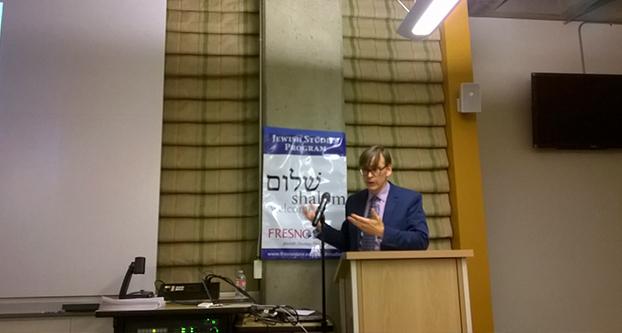Students learned about pivotal moments in Jewish poetry and engaged with critics in Sven-Erik Rose’s lecture “In Adorno’s Blind Spot: Yiddish Poetry from the Warsaw Ghetto.”
Rose, associate professor of German and comparative literature at UC Davis, said he was invited to Fresno State to present his current research that is part of his book project.
Rose said he was especially happy to talk about poetry written during the Holocaust and in the ghettos because it is under-read.
“I want people to know that there was a very vibrant and courageous cultural production in the ghettos even as the Nazis were carrying out the genocide of European Jews,” Rose said. “People thought about it quite courageously, reflected on it and wrote very powerfully about it.”
He added, “I want [people] to be inspired to go out and look at some of these texts.”
The lecture, which was held in the Henry Madden Library on Wednesday, analyzed a moment in Yosef Kirman’s poem “Eyes Remain Open” written in 1942, that captures a mundane act of bartering amidst the tragedy of the Warsaw Ghetto.
Jill Fields, coordinator for the Jewish studies program, said the event was about the poetry of poets who were in the Warsaw Ghetto and about theorists’ ideas on representing genocide.
Fields said she learned that a very well-known theorist called Adorno had famously written that “to write poetry after Auschwitz is barbaric.”
“What he didn’t know when he wrote those words was that there was poetry being written during the Holocaust,” Fields said.
“It was interesting that Adorno’s views did change over time, and over that same period there started to be more information about the experiences of those who died and those who survived,” Fields said.
Mary Johnson, an English undergraduate, said that Rose’s presentation was well-planned.
“He was very able to talk clearly and intelligently on this very sensitive topic,” Johnson said.
Brian Stiles, a history graduate, thought it was very enlightening.
“It was very interesting to hear such a brief and terrible period of history expounded upon more than it has been in the past,” Stiles said.
He said these poems will never reach their intended audience.
“The best that we can do now is to put them on display, get them out there and validate those stories,” Stiles said.
Fields said Jewish studies sponsored many lectures and films about different aspects of Jewish experience.
“We also have the Day of Giving on Nov. 2 which is going to be a university-wide fundraising campaign focusing on that day,” Fields said. “There have been a select number of programs that are going to be highlighted in Jewish studies.”





